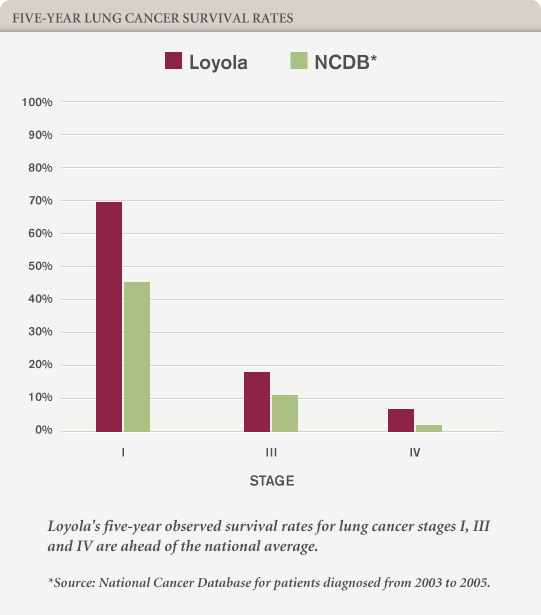Multidisciplinary Approach to Treating Lung and Thoracic Cancers
Loyola Medicine’s lung and thoracic oncology program at the Cardinal Bernardin Cancer Center combines compassionate, multidisciplinary care with research to fight the number one cause of cancer death for men and women in the United States. The program takes a comprehensive and individualized approach to patient care. Loyola offers a wide variety of services including cancer prevention, diagnosis, treatment, research and supportive care.
Loyola is proud to offer you a one visit, one location approach for lung and thoracic cancer. If you have lung and thoracic cancer, Loyola provides you access to an experienced team of surgical oncologists, medical oncologists, radiation oncologists, radiologists, pathologists and nurses in one day. Our multidisciplinary program means you receive a comprehensive evaluation, diagnosis and treatment plan designed specifically for you.
Lung and thoracic cancer forms in the tissues of the lungs or in the chest cavity. Loyola’s multidisciplinary team of doctors has the expertise in diagnosing and treating the following lung and thoracic cancer types:
- Chest cancer
- Diaphragm cancer
- Esophageal cancer
- Heart cancer
- Lung cancer, including non-small cell and small cell
- Lung carcinoid tumors
- Lung or pleural masses
- Mediastinal masses
- Mesothelioma, including malignant mesothelioma
- Pericardial cancers
- Thymomas
- Tracheal cancers
- Unresolved infiltrates
Loyola is committed to developing new and effective therapies for lung and thoracic cancer. Our team’s efforts include designing clinical trials that bring new drug therapies to our patients, laboratory research on the biology of lung cancer and the exploration of new strategies to prevent, diagnose and cure lung cancer. In addition, highly targeted drugs that act more selectively on cancer cells and have a less toxic effect on normal cells are available in our clinic.
How are Lung and Thoracic Cancers Diagnosed?
Doctors in the lung and thoracic oncology program at Loyola take a team approach to the diagnosis and treatment of lung and thoracic cancer. A patient’s personal and family medical history, symptoms, physical exam and imaging tests can help identify abnormal growth or diagnose cancer. Loyola offers the most advanced diagnostic and imaging tools available, including:
- Chest X-ray
- CT scan (computed tomography)
- Endobronchial and esophageal ultrasound
- PET scan (positron emission tomography)
In addition to imaging tests, doctors will most often perform one of the following biopsies to accurately diagnose and stage lung or thoracic cancer:
- Bronchoscopy
- Fine needle biopsy
- Surgical biopsy
How are Lung and Thoracic Cancers Treated?
Early and precise diagnosis and staging of lung cancer and other thoracic cancers is important for successful cancer treatment. At Loyola, treatment plans are formulated by a skilled team of specialists, including:
- American Cancer Society patient navigator
- Dietitians
- Medical oncologists
- Nurses
- Pathologists
- Pulmonologists
- Radiation oncologists
- Radiologists
- Social workers
- Thoracic surgeons
Lung and thoracic cancers are often complex and require multiple types of treatment. At Loyola, our specialists are dedicated to personalized care and improving outcomes for our patients by offering the latest in treatment options for lung and thoracic cancers:
- Chemotherapy
- Intensity-modulated radiation therapy (IMRT)
- Less-invasive surgical techniques, including robotic surgery
- Neoadjuvant therapy
- Radiation therapy
- Targeted therapy
- Techniques to help save lung function
You can also benefit from the unique support services offered at the Coleman Foundation Image Renewal Center, located within the Cardinal Bernardin Cancer Center. The center provides complementary and supportive care including art therapy, massage therapy, biofeedback, pain management, acupuncture, nutritional counseling and access to psychotherapists and spiritual care.
Early Detection and Screening for Lung and Thoracic Cancers
Loyola invites smokers and former smokers to enroll in a lung cancer screening, which has been shown to reduce the number of deaths from lung cancer by 20 percent. The screening includes a low-dose CT scan, which takes less than 15 minutes. Learn more about our Lung Cancer Screening Guidelines.
Five-Year Lung Cancer Survival Rates
Loyola is pleased to report that our five-year observed survival rates for lung cancer stages I, III and IV are ahead of the national average, according to the National Cancer Database.
